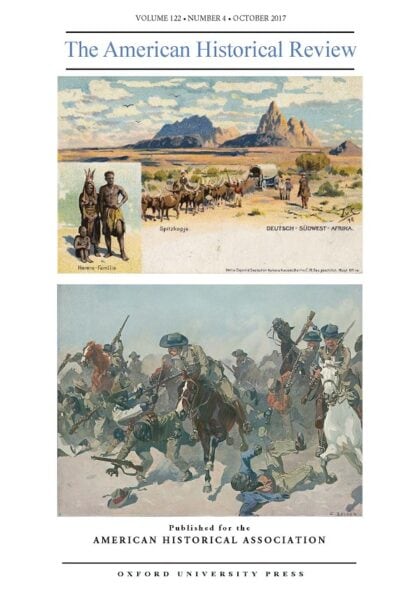
In “‘American Danger’: United States Empire, Eurafrica, and the Territorialization of Industrial Capitalism, 1870–1950,” Sven Beckert argues that during the last third of the 19th century, western European countries attributed the rise of the United States as the world’s dominant economy to the geographic advantages it enjoyed. Taking western continental expansion in North America as a model, Europeans looked to colonial conquest in Africa as a way to overcome perceived European territorial disadvantages. This 1898 German colonial postcard from the series “German Protected Areas” suggests the resonance between images of the US West and German colonialism in South West Africa (today’s Namibia). The postcard portrays a largely “empty land,” populated only by an ethnographically misleading depiction of Herero “savages.” In fact, by the time this card was produced, many Herero would not have dressed this way. Carl Becker’s popular illustration of the German colonial army, the Schutztruppe (“Protection Force”), on the other hand, depicts the Battle of Uitkomst, where mounted troops carried out merciless violence against the Herero, who rose against the Germans in 1904. It is a potent reminder that colonial powers in Africa faced resistance similar to that mounted against western expansion by Native Americans in the United States. Carl Becker, “Combat at Uitkomst,” in Friedrich Freiherr von Dincklage-Campe, Deutsche Reiter in Südwest: Selbsterlebnisse aus den Kämpfen in Deutsch-Südwestafrika (Berlin, 1908), between 40 and 41.
The October issue of the American Historical Review features five full-length articles, spanning the globe from the 17th century to the post–World War II period.
The issue opens with Macabe Keliher’s essay “The Problem of Imperial Relatives in Early Modern Empires and the Making of Qing China.” Keliher (West Virginia Univ.) uses a case study of the Manchus’ effort to impose imperial power during the early Qing era of the 17th century to examine problems relatives posed for dynastic rule. Kin could offer crucial support for a dynasty, Keliher argues, and yet they also created internal rivalries and even potential challenges to the throne. Hong Taiji—the Manchu ruler who consolidated the Qing dynasty—relied on his relatives for political and military support, but at the same time felt threatened and constrained by them. To placate them, Taiji gave his family administrative positions, but also imposed legal and ritualistic restraints to integrate them into the imperial bureaucracy. This neutralized the Manchu relatives as a threat to the ruler. Instead, they constituted a service elite and facilitated the conquest and rule of a vast multiethnic empire. Although Keliher researched and wrote this article before Trump’s inauguration, its implications have a chilling resonance for our contemporary moment.
Keliher’s piece is followed by a very different account of the interplay of monarchy and empire during the 17th century: Holly Brewer’s “Slavery, Sovereignty, and ‘Inheritable Blood’: Reconsidering John Locke and the Origins of American Slavery.” In this contribution to the intellectual history of the Atlantic world, Brewer (Univ. of Maryland) contextualizes Locke’s engagement with the problem of slavery in the British Empire. Historians have chided Locke, a crucial figure of the Enlightenment and the origins of modern democratic ideals, for his apparent commitment to human bondage. Brewer argues instead that Locke’s ideas about slavery should be understood in the context of the legal framework written, approved, and rationalized in hierarchical political contexts by the Stuart kings Charles II and his brother James II. These monarchs drew on feudal ideas about sovereignty, oligarchy, hereditary lordship, and slavery, adapting them to the new necessities of Atlantic slavery in a moment of imperial expansion. Brewer concludes that in his role as a member of the Board of Trade in the 1690s, Locke in fact helped reform Virginia laws and government, and objected to royal land grants rewarding those who purchased “negro servants.”
The third article in the October issue, “On the Origin of Theories: Charles Darwin’s Vocabulary of Method,” also considers intellectual history, but with a foray into cognitive science. In this essay, Henry Cowles (Univ. of Michigan) revisits Darwin’s theory of evolution to demonstrate how “vocabularies of method” can overdetermine theoretical conclusions. Darwin’s scientific method of testing hypotheses against evidence inadvertently served as a metaphor for his description of the natural world. Moreover, as Cowles puts it, “naturalization of a vocabulary of method helped pave the way for applications of evolutionary theory,” not only to the natural world but to the working of cognitive processes themselves. Attention to this dynamic, he suggests, has implications for “new directions for the study of cognitive history and the power of language to transform the historical imagination.”
From there, the issue moves into the military history of the Austro-Hungarian empire during the Great War. In “How to Break a State: The Habsburg Monarchy’s Internal War, 1914–1918,” John Deak (Univ. of Notre Dame) and Jonathan Gumz (Univ. of Birmingham) argue that as it entered the First World War, the Habsburg Empire was in fact quite stable. The stresses of wartime, however, eroded civil-military relations to the point that “the Habsburg Army declared its own internal war against the Habsburg civilian state.” Wartime exigencies allowed the army to undermine the rule of law, Deak and Gumz contend, and to arrogate to itself the task of managing the civilian populace under a “state of exception.” Rather than suffering from pre-existing weaknesses, they conclude, the rapid collapse of a stable constitutionalist state undermined by a military empowered in wartime was symptomatic of the general political crisis that faced Europe during the first half of the 20th century.
The October issue closes with “‘American Danger’: United States Empire, Eurafrica, and the Territorialization of Industrial Capitalism, 1870–1950,” by Sven Beckert (Harvard Univ.). During the last third of the 19th century, Beckert shows, a debate emerged in western European countries on what they called the “American danger.” In the face of the rapid rise of the United States as the world’s dominant economy, some European observers attributed their nations’ declining competitiveness to the territorial advantages enjoyed by their new economic rival. They envied the US capacity to integrate a dynamic industrial sector with raw materials, agricultural commodities, markets, and labor into a geographically contiguous national economy. In response, European statesmen, capitalists, and intellectuals advocated for territorial rearrangements of various European economies, a discussion that began as early as the 1870s and persisted through the aftermath of World War II. In an attempt to overcome perceived European territorial disadvantages, Beckert argues, they looked to African colonialism, violent territorial expansion within Europe itself, and, eventually, European integration. Beckert shows that these successive efforts to territorialize capitalist economies, usually understood as discrete historical processes, instead constitute a single long moment in the history of capitalism, reflecting the unsettling effects on European powers of the rise of the United States.
The issue’s “Communications” section contains an important exchange. It is no secret that our April 2017 issue featured strong letters denouncing a book review written by Raymond Wolters for advancing what one letter writer called “racist theories about educational achievement.” Robert Schneider, editor at the time the review (February 2017) and subsequent letters (April 2017) were published, found merit in the critics’ reading of Wolters’s review, apologized for running it, and commissioned another review of the book. That new review also appears in the October 2017 issue. I share with Rob the conviction that engaging with such matters honestly, rather than sweeping them under the rug, remains the best practice. A robust letters section advances open discussion of difficult issues, and we welcome it. It is our long-standing, stated policy to allow authors to reply to critical letters. For this reason, in the October issue we allow Professor Wolters the opportunity to respond to his many critics. Since, in his letter, Professor Wolters also criticizes the AHA’s editorial practices, I exercise as editor my own “right of response” to Wolters. As readers will see, he attempts to defend his use of the term “sociobiology” in his review. I retort that he entirely misses the point: as our readers correctly objected, his review—and now his letter—represent nothing more than an effort to dress up racist views in supposedly respectable intellectual garb.
Finally, the October issue marks a welcome restoration of long-term editorial stability to the journal. I served as interim editor for a year in 2015–16; former editor Robert Schneider then graciously returned for another interim year in 2016–17. I now have the pleasure of commencing a four-year term as editor, during which I hope to initiate some innovations (such as the return of film reviews to the journal’s pages). We also welcome a new reviews editor, Leone Musgrave. Kon Dierks will continue for another year as associate editor. This team intends to sustain the high degree of excellence bequeathed to us by Schneider’s decade-plus tenure as editor, for which we salute him.
This work is licensed under a Creative Commons Attribution-NonCommercial-NoDerivatives 4.0 International License. Attribution must provide author name, article title, Perspectives on History, date of publication, and a link to this page. This license applies only to the article, not to text or images used here by permission.



